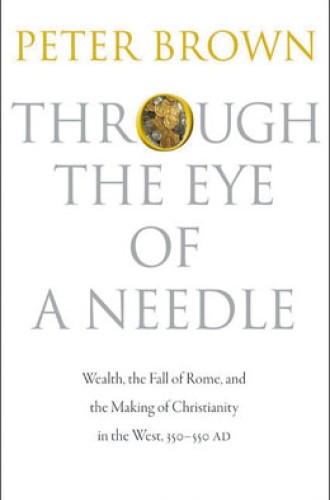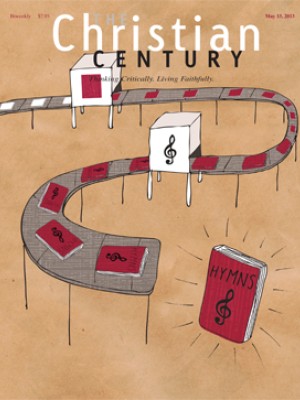Discovering the poor
One might think that the church’s stance toward money has always been simple, direct and constant. That has not been the case since the fourth century, says Peter Brown, one of the most learned and steadfast historians of the early church. Brown has written an extraordinarily dense and compelling book exploring the crisis of the church in the fourth century, when wealthy people joined the church in large numbers.
In an earlier book, Poverty and Leadership in the Later Roman Empire, Brown demonstrated that the great bishops of the church rhetorically invented the social category of the poor, a category that had been absent in the political economy of the Roman Empire. In his new book, he considers both the church’s radicality concerning wealth in the context of the empire, and its readiness to make accommodations as circumstances seemed to require.
Read our latest issue or browse back issues.
At the outset, Brown voices a remarkable decision concerning the scope of his study: he will focus on the years from 370, just before the election of Ambrose as bishop of Milan, to 430 and the fall of Rome. It is remarkable that Brown does not judge Constantine to be responsible for what we consider the Constantinianism of the church. Constantine is largely absolved of that charge because he took great risks and “deliberately chose a God as big and as new as himself.” Instead, it was the entry of the wealthy into the church, long after Constantine, that brought the church into settled social power and that led to accommodations to the political economy.
Brown begins by tracing out the practices of wealth in the Roman Empire and contrasting them with those of the church. The imperial practice of wealth concerned civic exhibits of generosity toward the common good. All citizens benefitted from this practice, and no distinction was made between rich and poor, haves and have-nots. Thus the category of the poor could not appear. The defining distinction in this practice was between citizens and strangers.
By contrast, the church consisted of “countercultural communities.” Brown observes that “the Constantinian revolution needed such a counterculture” because in civic generosity there was “a sense of hierarchy” and a “pace of competition” from which many people needed relief. The church came to be, for such persons, a “social urban lung,” an “escape hatch.”
What Brown describes sounds hauntingly like the rat race of successful people in our society who are exhausted by social expectations. The reason the church’s practice of money was different was that with the critical self-consciousness of the rich, the social reality of the poor redefined all social relationships. Giving took on a very different meaning: it carried less social pressure and expectation but more authentic passion for human solidarity and well-being.
The contrast between civic generosity and gospel practice was triggered by the bold interpretive ventures of Christian preachers and teachers, not least the great bishops. The fourth century was a time of great dispute about money in the church. The material ground for that dispute was that it was “the Age of Gold,” when extraordinary affluence emerged. Brown’s argument (and title of his book) alludes to Jesus’ terse teaching, recorded in Mark 10:25, concerning the camel and the eye of the needle. Brown also calls this period of enormous wealth “the age of empire” and “the age of the camel”—during which camels, for the sake of the eye of the needle and access to the kingdom, might renounce their wealth.
The emerging question in the church concerned the relation of great wealth and the offer of salvation. In contrast to the imperial practice of civic generosity, the church was a venue of “moral zero tolerance” on this point, but it also offered a place of forgiveness, enabling the wealthy to reposition their wealth in the context of God’s grace.
Brown traces the dispute in the church through journals, sermons and teaching tracts, then weaves the data together into a narrative. Sermons in particular, with their direct moral instruction, served as “the hidden iceberg” to instruct and motivate people in gospel thinking. Generosity toward the poor, those unnoticed in civic generosity, became a focal point in the preaching and practice of the church.
The body of Brown’s book considers the great interpretive conflicts of the fourth century involving Augustine and Jerome. Through this period the “love of the city” was slowly displaced by “the love of the poor.” The radicality of this teaching “joined the very top of society to the very bottom,” so the “others” (beggars) came to be regarded as “brothers.” The effect was the imagination of a “spiritual efficacy” that implied “a joining of heaven and earth that a non-Christian would have perceived as utterly incongruous.”
The earthly notion of “commerce” and the heavenly notion of “gift” converged in a witness to the materiality of faith that has very old biblical roots. The outcome was that care for the poor came to be seen as an act of “supernatural communion” in which gifts to the poor were considered “loans to God.”
Brown offers rich documentation of the preaching and teaching that produced this radical sensibility. Ambrose, with fearless passion, condemned avarice as “the root of all evil.” His exposition of the tale of Naboth’s vineyard was a direct challenge to the rich landowners in Milan. Jerome held uncompromisingly to an ascetic ideal and eschewed accumulation of wealth.
Along with noting these great teachers, Brown considers Paulinus—a new entry for many of us—who wrote an annual poem for the Festival of St. Felix. Paulinus’s poetry stressed the “mystical symbiosis” between rich and poor. His exposition of the parable of the rich man and Lazarus is presented as an alternative mode of social relationships—the rich man might have escaped punishment had he given alms to Lazarus instead of being totally absorbed in himself.
This testimony to the gospel’s radical claim on money was intense and constant, according to Brown’s narrative. But of course there was a vigorous countertheme as well. Not surprisingly, Augustine lived in a world of social realism and judged that such a radical posture was unsustainable in a church peopled by the wealthy. He transposed the issue of “rich and poor” into “rich and wise,” so wealth itself did not come under judgment as it did in the passion of Ambrose and the asceticism of Jerome. What mattered to Augustine was the deployment of wealth in a way that could be good.
This departure should be noted for what it is: a characteristic move in the church’s long history of accommodation. Brown comments: “Augustine rendered wealth unproblematic because its origins were held to be opaque. Like grace itself, wealth was a phenomenon Augustine had removed from human scrutiny.” In keeping with Augustine’s familiar categories, pride, not wealth, was the problem. This interpretive maneuver sounds like a later maneuver by Calvin, who accommodated his mercantilist constituency by approving the charging of interest on loans.
As Brown nears the end of his chronological period, he demonstrates the way in which the weight of wealth decisively moved the church toward an accommodationist perspective. While the great teachers and bishops summoned believers to radical obedience, in the long run that radicality was siphoned off into an effort for “the next world.” With considerable theological support, the wealthy turned their attention from the materiality of social relationships to a spirituality for the next life. Priests were made other by celibacy, by different appearance, and by being cast in a zone apart from materiality.
One can see in Brown’s narrative that the disputes of the fourth century stand between the old civic generosity and a new concern for otherworldliness. Perhaps that transitory radicality could not be sustained. But it has bequeathed to the church a “conglomerate of notions” that link the wealth of the church, the care of the poor and the fate of the soul.
These ancient issues continue to haunt the church. There is still a needle’s eye and a host of camels in waiting. Reading Brown’s elegant review requires hard work, but such hard work may give us critical perspective on our own too-easy accommodations.






